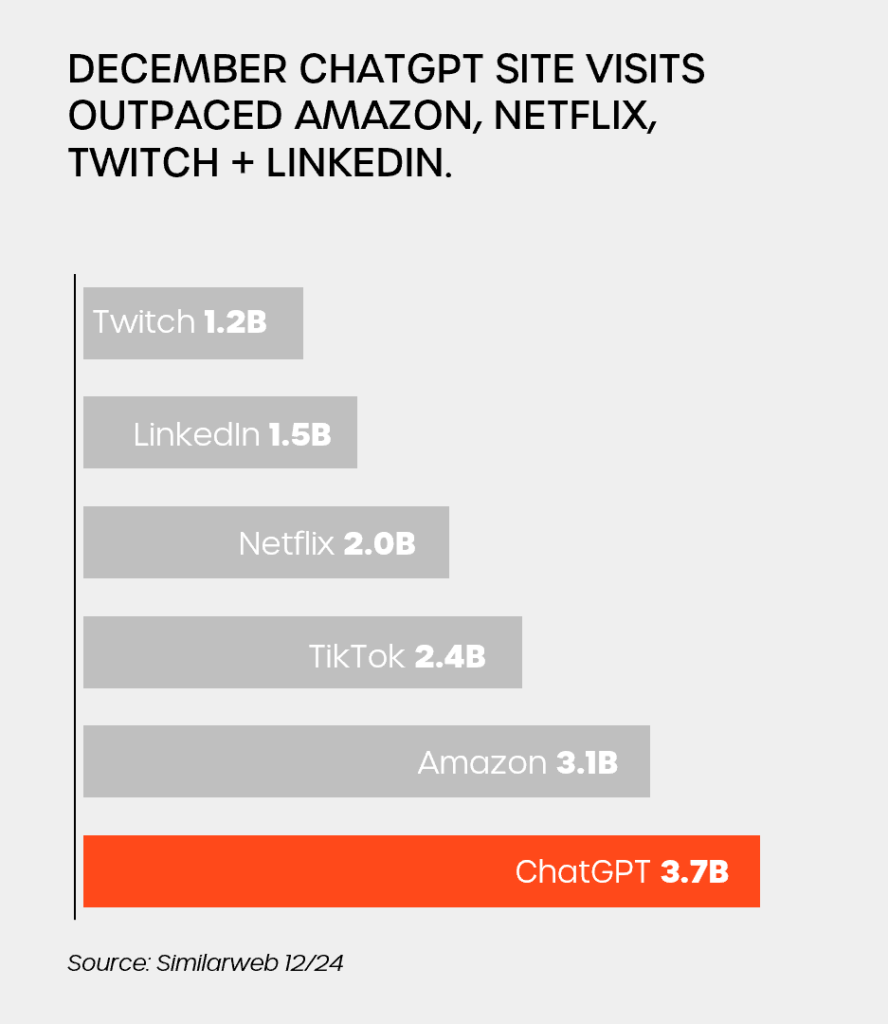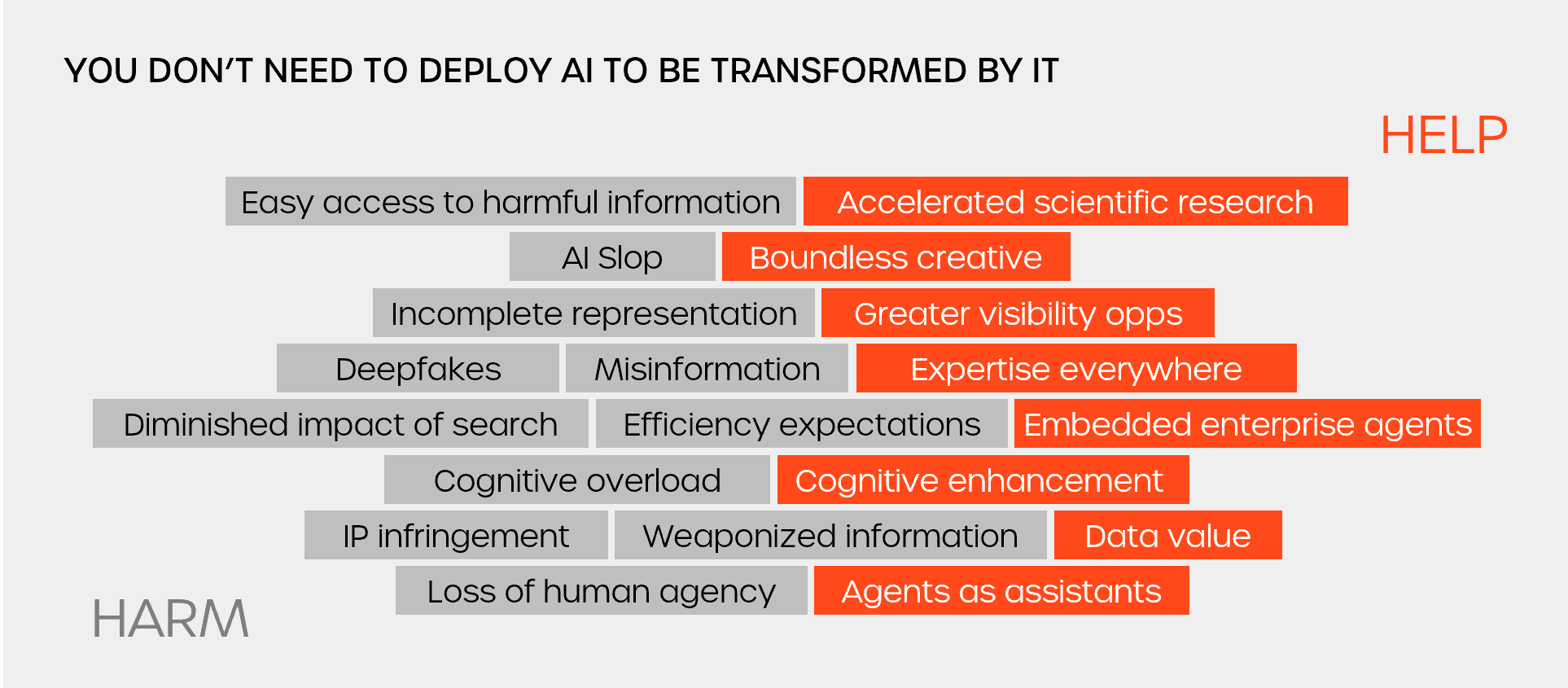This issue is excerpted from a recent Perspective Agents Substack by Chris Perry about today’s generative world and the opportunities and threats for communicators.
The moment I realized something radically changed, I started speaking Portuguese. Last November, in the shadows of a stage in São Paulo, I watched a self-created digital twin deliver part of a keynote presentation to technology leaders.
Although I don’t speak the language, the synthetic me on screen did quite well. It engaged the audience more deeply than my English delivery possibly could.

It was a true-to-life, a-ha moment. This simulation took about four minutes to create. An avatar engine called HeyGen learned the contours of my face, voice inflections, and mannerisms. It then translated my talking points and delivered a presentation-ready, 4K version of a second self. The experience of making and then seeing it was unsettling.
For many, pervasive discussions around AI will become real through mind-blowingly good simulations like this. Despite years of research and countless hours in tech labs, I sensed following the demo that this technological force might actually be underhyped. The unrelenting surge in AI suggests a technological supernova is here.

Functionality and potential use cases are exploding. Google’s AI suite includes personal AI notebooks, deep research assistance, and more personalized search. Anthropic’s Claude updates include taking over your PC to execute programming tasks or providing assistance like trip planning. All the major players, notably Apple and Microsoft, now embed genAI into their operating systems. To realize the long-talked-about potential this brings, enterprises are predicted to spend roughly a quarter of a trillion dollars on AI this year.
How leaders deploy intelligence will change rapidly. Through agentic AIs, NVIDIA’s CEO Jensen Huang told a crowd at CES that “digital workers” will arrive in 2025, representing a new field force that can understand tasks, plan, and take action autonomously.
We need a deeper understanding of what’s to come, both psychologically and practically, to avoid being shocked by the scale and pace of displacement.
ADAPTING TO A “GENERATIVE WORLD”
With all this power, AI will remold how we comprehend the world around us. Work will move from routine jobs to roles centered on emotional intelligence and complex problem-solving. Education will evolve from standardized knowledge delivery to personalized learning and creative synthesis. Social relationships will become even more mediated through AI-enhanced connections.
This isn’t just a theoretical vision of the future. It’s becoming present reality.
AI systems now generate everything from legal contracts to drug molecules, while algorithms shape public discourse as powerfully as human voices. In boardrooms and research labs across the globe, these technologies are fundamentally reshaping how we work, create, and solve problems.
Consider several vignettes about what’s happening globally:
- In London, narrative intelligence engines map invisible threads between brands, beliefs, and behavior. They don’t just analyze content—they decode culture, revealing how stories flow between influencers, politicians, and media networks. This is pattern recognition at a scale that makes traditional market research look like stone tablets.
- In Singapore, a strategy team runs hundreds of simultaneous scenario simulations. They’re not just predicting policy reactions—they’re experiencing possible futures in real-time, watching how ideas ripple through simulated societies. The gap between planning and experience has collapsed.
- In San Francisco, developers watch AI-generated videos of perfectly sliced steak, born not from a culinary class but from a machine. They aren’t marveling at the quality of the output; they’re benchmarking the performance of their new model against others. The uncanny valley of technological simulations isn’t just shrinking—it’s closing entirely.
- Across the Bay, an AI platform CEO reimagines advertising for a world where agents, not humans, make product suggestions. These micro-AIs will filter information, evaluate options, and optimize choices for us. Madison Avenue’s next audience won’t be human.
- In New York, a startup demonstrates human-like avatars that blend the visual presence of world-class experts with exceptional conversational ability. Imagine instant access to global authorities on any topic, their knowledge perfectly preserved and perpetually available. The democratization of expertise has begun.
DISTRIBUTION OF UNDERSTANDING IS AN OPPORTUNITY AND A THREAT
An often-repeated quote about change comes from science fiction writer William Gibson, who said, “The future is here. It’s not evenly distributed.” Unevenly distributed, in this case, applies to government agencies, companies, and individuals working—or not—with AIs. The distribution, both the growing expertise and ignorance, is widening. It’s a real and risky side effect of AI’s lightning-fast ascendance for those outside looking in.

Competitors or new companies integrating AI into their operations can quickly displace yours. Proprietary IP can become training data without permission. A CEO’s voice can be cloned in minutes. Carefully crafted messages can be drowned in a sea of synthetic content.
If you watch closely, you can see a strange new world being born.
The transmission of knowledge now operates in two dimensions: one designed for human perception and another engineered for the algorithmic systems that increasingly shape our understanding.
The nature of human connection is being rewritten. In my São Paulo moment, I witnessed something profound: it can transcend native language, culture, or even reality. At times, connection flows more freely through artificial channels, digital twins, and synthetic media that bridge the gaps our biological selves cannot.
With this, reality has become fluid, negotiable, and a medium to be shaped rather than a foundation to build on. The old certainties—what’s real, authentic, and genuine—haven’t disappeared, but they’ve evolved into something more complex.
THERE’S NO AI OFF-RAMP
The moment presents business leaders with extraordinary opportunities and challenges. Recent research shows that 92% of enterprises are engaged with AI, yet only 26% have developed capabilities to generate tangible value. The gap suggests adoption without purpose, movement without meaning—the corporate equivalent of running full speed into the dark.

The core challenge for leaders isn’t technological—it’s philosophical.
How do you maintain authentic leadership when AI can simulate authenticity?
How do you develop your team’s ability to use AI effectively while preserving human judgment?
How do you build lasting trust in an environment where the line between real + artificial continues to blur?
The answers aren’t simple, but they begin with experiences like mine in São Paulo—moments when we feel how profoundly the ground is shifting beneath our feet. We can traverse uncertainties and adapt to a generative world by:
USING SIMULATION FOR SENSEMAKING
It becomes a primary way to think, plan, and create. Leaders no longer need to ponder forecasted scenarios—they live inside them. They feel the ripple effects of decisions not yet made, experience the emotional resonance of messages not yet sent, and understand the impact of strategies not yet deployed.
UNDERSTANDING PUBLIC DISCOURSE TO SHAPE STRATEGY
Understanding the web of beliefs, values, and cultural currents that shape how people find meaning is non-negotiable. AI doesn’t just map conversations; it reveals the underlying patterns of human behavior across cultures, demographics, and worldviews that can make or break strategic actions.
EMBRACING HUMAN VALUES—AND IMPERFECTIONS—IN THE WORK
As AI systems become more sophisticated and ubiquitous, the distinctive qualities of human experience take on new significance. The slight hesitation in a CEO’s voice when addressing a crisis, the unscripted moment of vulnerability in a news conference, the genuine stumble in a product launch—these moments of authentic human presence become more influential because they can’t be engineered.
Reflecting on my digital twin’s near-flawless delivery, I was reminded that simulated perfection doesn’t guarantee a genuine connection.
We see it in the public mood. People can distinguish between acts manufactured to be perfect and those that are perfectly imperfect. They’ve developed a new literacy, an ability to distinguish between engineered empathy (B.S.) and nuanced engagement (the real stuff).
Ultimately, the most valuable thing isn’t simulated perfection—it’s presence, judgment, and understanding that can only come from being human.
A generative future isn’t approaching; it’s already randomly distributed. Like a celestial supernova, AI is simultaneously collapsing and expanding, destroying and creating, ending one era while seeding the elements of the next.
We welcome comments and questions via [email protected].


